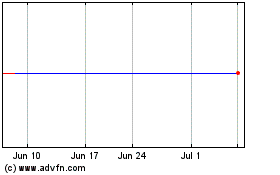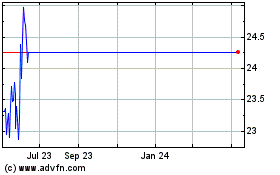Hungary Rates Setters Unanimously Voted to Keep Rates Unchanged, Use Other Tools
December 23 2015 - 9:21AM
Dow Jones News
By Margit Feher
BUDAPEST--Hungarian rate setters unanimously voted in December
in favor of keeping the benchmark rate unchanged at its record low
and agreed that they will use unconventional tools, instead of
interest rates, to loosen monetary conditions further, minutes of
their Dec. 15 rate meeting, published Wednesday, show.
All members of the nine-strong rate panel argued that "the
inflation target could be achieved in a sustainable way by holding
the base rate unchanged for an extended period and by using
unconventional, targeted monetary policy instruments."
The council members are examining "thoroughly" the range of
tools they may use, the minutes added.
The National Bank of Hungary, which reduced its benchmark rate
to a record low 1.35% in July, kept its main rate steady in
December for the fifth consecutive month as analysts had expected.
The policy rate was 7.0% in August 2012, when it started its
monetary easing.
At December's rate meeting, the central bankers agreed they
should pursue policies that will push inflation close to the 3%
inflation target not just for a short period but for an extended
period--as they put it, "in a sustainable" way.
"To this end, solid economic growth and maintaining loose--if
necessary looser than the current--monetary conditions were
required over an extended period," they said.
Annual headline inflation was 0.5% in November. And most
analysts expect Hungary to keep its benchmark rate unchanged at its
current level into 2017.
The rate-setters reckon unconventional monetary-policy
instruments are more effective than the benchmark rate to reduce
the yields of long-maturity government bonds denominated in the
local currency.
"Government bond yields have come lower but they must be driven
to the ground," central bank Vice Governor Marton Nagy said Dec.
18.
The central bank won't buy government bonds either on the
primary or the secondary market to influence yields, but will amend
its existing unconventional tools in early 2016 to prompt
commercial banks to buy more government bonds, Mr. Nagy said.
Through its unconventional tools, the central bank wants to push
commercial banks to use their excess funds for buying government
bonds and lending to the business sector, instead of depositing the
funds with the central bank.
Write to Margit Feher at margit.feher@wsj.com; Twitter:
@margitfeher
(END) Dow Jones Newswires
December 23, 2015 09:06 ET (14:06 GMT)
Copyright (c) 2015 Dow Jones & Company, Inc.
World Fuel Services (NYSE:INT)
Historical Stock Chart
From Mar 2024 to Apr 2024

World Fuel Services (NYSE:INT)
Historical Stock Chart
From Apr 2023 to Apr 2024
